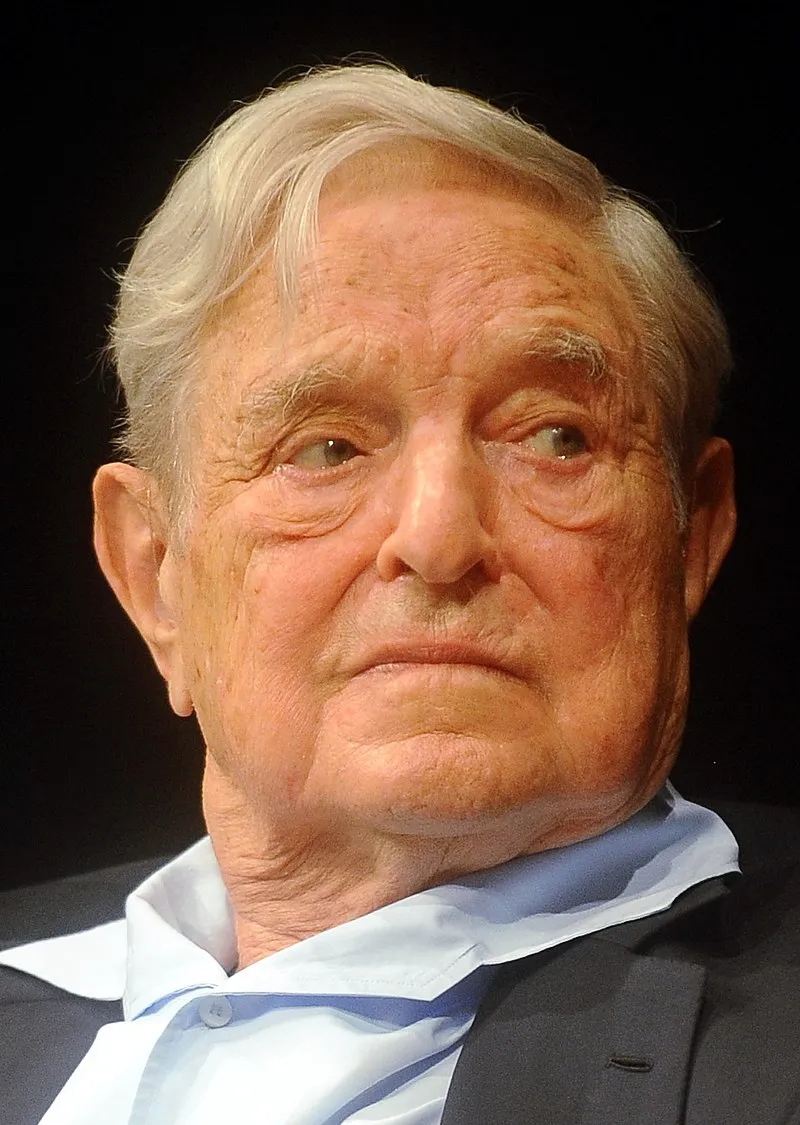George Soros, often a lightning rod for political controversy, is one of the most successful investors of all time. His name is synonymous with both massive financial gains and significant political influence. While many know Soros for his philanthropic efforts and political activism, fewer are aware of the financial maneuvers that solidified his reputation as a legendary figure in the investment world. One of the most compelling stories is how he almost broke the Bank of England and earned a billion dollars in the process.
This tale takes us back to a time before the euro existed, during an era when European currencies operated in a more volatile and competitive environment. Soros’s keen eye for economic trends and his willingness to take calculated risks set the stage for one of the most famous financial events in history. He identified a flaw in the European Exchange Rate Mechanism (ERM) and exploited it with precision. This wasn’t just a lucky bet but a strategic move based on thorough analysis and impeccable timing. His actions on that fateful day demonstrated not just financial acumen but also an understanding of the broader economic implications, showcasing his ability to influence markets on a grand scale.
Post-War Europe and the Path to the ERM
In the aftermath of World War II, Europe was left devastated, both economically and socially. To prevent another catastrophic conflict, European nations sought to foster unity and economic interdependence. This led to the creation of several initiatives aimed at bringing the continent closer together. One of the most significant steps was the formation of the European Exchange Rate Mechanism (ERM) in 1979. The ERM aimed to stabilize exchange rates, reduce inflation, and prepare for a future single currency, which eventually became the euro.
The idea was that by linking their currencies at fixed rates, European countries could facilitate easier trade and economic cooperation. This would make it less likely for conflicts to arise, as the economies of these nations would be closely intertwined. However, the ERM was a complex system that required constant vigilance and intervention by national banks. Countries had to maintain their currency values within agreed-upon limits, which often meant buying or selling currencies to correct deviations caused by market pressures.
This system, while beneficial in theory, made national banks vulnerable to speculative attacks. It created an environment where investors like George Soros could identify and exploit weaknesses. The ERM's vulnerability stemmed from its inability to accommodate the unique economic conditions and needs of each member country, setting the stage for future financial upheavals.
Thatcher's Reluctance and Major's Influence
Margaret Thatcher, the formidable Prime Minister of the United Kingdom, was acutely aware of the potential pitfalls of the European Exchange Rate Mechanism (ERM). Her economic philosophy was firmly grounded in market-driven policies, and she recognized the inherent flaws in tying the British pound to a fixed exchange rate system. Thatcher believed that the ERM would strip the UK of its ability to control its own monetary policy, particularly in times of economic distress.
Throughout the 1980s, Thatcher resisted joining the ERM, understanding that each country’s economy is unique and requires tailored monetary policies. However, by the end of the decade, Britain's economic situation was deteriorating. Unemployment was high, inflation was persistent, and the political climate was shifting. Within her Conservative Party, a growing faction advocated for closer ties with Europe, believing it would stabilize the economy and improve trade relations.
John Major, then the Chancellor of the Exchequer, was a leading proponent of this view. His influence grew as Thatcher’s grip on power weakened. In October 1990, amid political pressure and economic challenges, Britain joined the ERM. This move was seen as a victory for Major and the pro-European members of the Conservative Party. Just a month later, Thatcher resigned, and Major became Prime Minister. He championed the ERM, hoping it would restore economic stability and strengthen Britain’s position in Europe. However, this decision set the stage for one of the most dramatic financial episodes in British history.
Britain's Struggle Within the ERM
When Britain joined the European Exchange Rate Mechanism (ERM) in 1990, the country was already grappling with a severe economic recession. The fundamental problem was that the ERM required member countries to maintain their currency exchange rates within narrow bands, which severely limited the Bank of England’s ability to manage the economy. Normally, during a recession, a central bank would lower interest rates to stimulate economic growth. However, under the ERM, lowering interest rates would weaken the pound, risking its devaluation outside the allowed limits.
The British pound was particularly vulnerable. At the time, the UK's inflation rate was three times higher than Germany's, making it difficult to maintain a strong currency. Despite this, John Major, then Prime Minister, and his government were committed to staying within the ERM. They believed that maintaining a strong pound would control inflation and bring long-term economic stability.
From 1990 to 1992, the Bank of England fought to keep the pound within the ERM limits. This involved frequently intervening in the foreign exchange markets, buying up pounds with its reserves to prop up the currency. However, these efforts were akin to putting a Band-Aid on a gaping wound. The pound continued to weaken, and the high interest rates needed to support it further strained the British economy, deepening the recession.
The situation became a classic example of the conflict between political aspirations and economic realities. As the British government clung to the ERM, it faced growing pressure from currency speculators who saw the pound’s vulnerability and the inevitable devaluation looming on the horizon. This precarious balance couldn’t hold indefinitely, setting the stage for a dramatic financial showdown.
Soros's Strategic Bet Against the Pound
George Soros, renowned for his sharp investment strategies, saw a golden opportunity in Britain's precarious position within the ERM. As the pound struggled under the constraints of fixed exchange rates, Soros anticipated a devaluation and prepared to capitalize on it. Starting in August 1992, he began to build a massive position against the pound, borrowing pounds and converting them into stronger currencies like the German mark.
Soros’s strategy was to short the pound: he borrowed large amounts of the currency, sold it at the current rate, and planned to buy it back later at a lower price, pocketing the difference. By the end of August, Soros had amassed a $1.5 billion bet against the pound, yet the currency’s value had barely budged. He needed a trigger to ignite a massive sell-off.
The catalyst came on September 16, 1992, when the President of the Bundesbank made a seemingly innocuous statement that some currencies might come under pressure. Soros seized on this vague comment, interpreting it as a signal that the pound was vulnerable. Overnight, while Europe slept, Soros aggressively borrowed and sold pounds, amassing a $10 billion short position by morning.
When the markets opened, the Bank of England was overwhelmed by the scale of Soros's attack. The central bank’s interventions, including buying billions of pounds and raising interest rates, proved futile against the tidal wave of selling. Soros's calculated move demonstrated not only his financial acumen but also his understanding of market psychology. By orchestrating this massive sell-off, he forced the pound’s devaluation, resulting in a historic financial victory for his hedge fund and a humiliating defeat for the British government.
The Bank of England's Desperate Measures
As George Soros executed his massive bet against the pound, the Bank of England found itself in a desperate battle to defend its currency. On the morning of September 17, 1992, the scale of the assault became clear. In response to Soros's $10 billion short position, the Bank of England initiated emergency measures to stabilize the pound. At 8:40 AM, they authorized the purchase of one billion pounds in the market, but this initial intervention had no significant effect.
By 9 AM, another two billion pounds had been purchased, yet the pound continued to plummet. The Chancellor of the Exchequer, Norman Lamont, sought permission from Prime Minister John Major to increase interest rates, a move that would typically support the currency but also exacerbate the recession. Initially, Major hesitated, aware of the political and economic consequences.
However, as the relentless selling continued, Major conceded. By 11 AM, Britain announced a dramatic two percent interest rate hike, one of the largest in recent history. Despite this bold move, the pound remained under intense pressure. Throughout the day, the Bank of England bought a staggering 27 billion pounds and raised interest rates again to 15%.
These frantic efforts underscored the severity of the situation. The high interest rates were intended to attract investors back to the pound, but the market had lost confidence. Soros and other speculators continued to sell, undeterred by the government's actions. By the end of the day, it was clear that the Bank of England's resources were being rapidly depleted, and the pound's defense was unsustainable.
At 7:30 PM, the British government admitted defeat. In a somber news conference, they announced the suspension of the pound from the ERM and the cancellation of the interest rate hikes. The Bank of England's desperate measures had failed, leading to a dramatic and costly exit from the ERM, known as Black Wednesday. This event not only marked a significant financial loss but also a profound shift in Britain’s economic policy.
Black Wednesday's Immediate Aftermath
The financial chaos of September 17, 1992, dubbed Black Wednesday, left Britain reeling. The pound's suspension from the ERM marked a humiliating retreat for the British government and the Bank of England. Despite their efforts to stabilize the currency, including purchasing 27 billion pounds and raising interest rates to 15%, the pound's value continued to collapse. By the end of the day, the British government had no choice but to concede defeat, withdrawing from the ERM and cancelling the interest rate hikes.
The immediate aftermath was brutal. The pound plummeted by 15% against the German mark and 25% against the US dollar. For George Soros and his hedge fund, this devaluation translated into a billion-dollar profit. However, the British taxpayer bore a heavy burden, with the estimated cost to the economy exceeding 3 billion pounds. The government's credibility was severely damaged, and the political fallout was significant, shaking the Conservative Party's confidence and its standing with the electorate.
Yet, amid the financial wreckage, an unexpected silver lining emerged. Freed from the constraints of the ERM, the Bank of England regained control over monetary policy. This newfound flexibility allowed the central bank to lower interest rates significantly, stimulating economic growth. Over the next few years, Britain’s economy began to recover. By 1997, the pound had regained its strength, and the UK entered a period of sustained economic expansion.
Ironically, what initially appeared to be a disaster helped set the stage for long-term prosperity. The flexibility to adjust interest rates and control inflation independently proved beneficial. While Black Wednesday was a short-term catastrophe, it inadvertently paved the way for a decade and a half of economic growth, leading some to retrospectively label the event as White Wednesday. The episode highlighted the importance of adaptable monetary policy and the risks of rigid economic frameworks.
The Unexpected Silver Lining
Despite the immediate turmoil of Black Wednesday, the aftermath revealed an unexpected silver lining for the British economy. Freed from the rigid constraints of the European Exchange Rate Mechanism (ERM), the Bank of England was once again able to manage monetary policy independently. This newfound autonomy allowed the central bank to implement much-needed interest rate cuts, which helped stimulate economic activity and growth.
In the years following Black Wednesday, the British economy began to recover. Lower interest rates made borrowing cheaper, encouraging both consumer spending and business investment. This monetary flexibility proved to be a crucial factor in revitalizing the economy, which had been stifled under the ERM's fixed exchange rate system. The pound, though initially devalued, started to regain its strength as investor confidence returned.
By 1997, the British economy was on a solid path to recovery, experiencing one of the longest periods of uninterrupted economic growth in its history. The pound became stronger than it had been during its time in the ERM, and the UK's economic policies, now free from the constraints of the fixed exchange rate system, allowed for more responsive and effective management of inflation and economic cycles.
This period of growth validated the argument that a flexible exchange rate regime was better suited to the unique economic conditions of each country. While Black Wednesday was initially seen as a national embarrassment and financial disaster, it ultimately highlighted the resilience and adaptability of the British economy. The lessons learned from this episode reinforced the importance of having control over monetary policy to address economic challenges effectively.
Ironically, George Soros’s bet against the pound, while profitable for him, also played a role in liberating the British economy from a constrictive framework. This enabled the UK to embark on a period of economic prosperity, demonstrating that sometimes short-term pain can lead to long-term gain. The event came to be known not just for its immediate impact, but for the lasting positive changes it brought about in British economic policy.
Soros's Legacy and Financial Education
George Soros’s audacious bet against the British pound not only earned him a billion dollars but also cemented his legacy as one of the most astute and influential investors of his time. His actions on Black Wednesday demonstrated a deep understanding of global financial markets and the vulnerabilities within fixed exchange rate systems. Soros's ability to predict and exploit market weaknesses showcased his strategic brilliance and established him as a formidable figure in the world of finance.
Soros’s approach to investing was not merely about capitalizing on opportunities but also about understanding the broader economic and political landscapes. His success against the Bank of England underscored the importance of thorough market analysis and the willingness to take calculated risks. This event became a textbook example of how a single investor could influence national economies, highlighting both the power and potential dangers of speculative trading.
In addition to his financial exploits, Soros has dedicated a significant portion of his wealth to philanthropy and education. He established the Open Society Foundations, aimed at promoting democracy, human rights, and economic reform across the globe. His commitment to financial education is also evident through his support for academic institutions and educational initiatives that foster a deeper understanding of economic principles and market dynamics.
Soros's own story, particularly his role in Black Wednesday, serves as a valuable lesson for aspiring investors and economists. It illustrates the impact of informed decision-making and strategic foresight. Through his philanthropic efforts and public discussions, Soros has encouraged a more nuanced appreciation of how financial markets operate and the importance of regulatory frameworks to maintain economic stability.
For those keen on learning about the intricacies of financial markets, Soros's career provides rich insights. His experiences emphasize the importance of critical thinking, market analysis, and the ethical considerations of investing. In a broader sense, Soros’s legacy extends beyond his financial achievements, contributing to a more informed and educated approach to global finance and economics.






